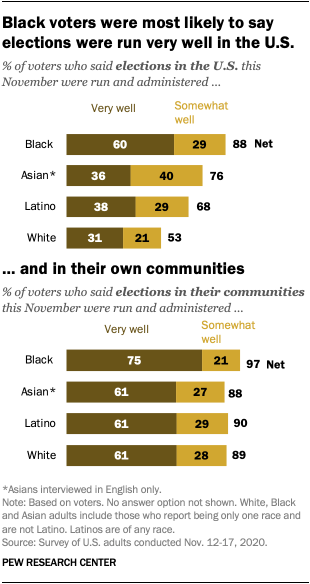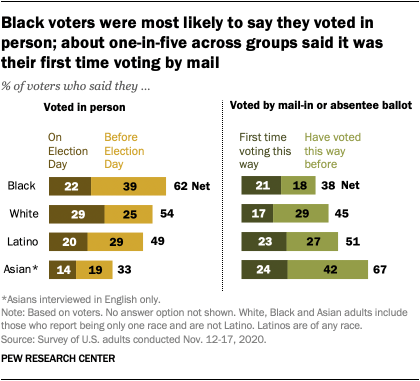In the days following the November 2020 election, about six-in-ten American voters said that the 2020 election was run well in the United States, but Black voters were more likely than voters in other racial and ethnic groups to say the election was administered very well both nationally and in their own communities.
A record number of Americans voted in the November 2020 election despite logistical challenges faced by state and local governments due to the COVID-19 pandemic. The election also featured a record number of votes cast before Election Day. More than 100 million Americans voted early in person or by mail-in or absentee ballot. Overall, the 2020 presidential election had the highest turnout rate among eligible voters since 1900, contributing to Joe Biden and Donald Trump becoming the top two presidential vote-getters in U.S. history.
About nine-in-ten Black voters (88%) said the elections nationally were run and administered well in the weeks after the election, including 60% who said they were run very well. Smaller majorities of Asian (76%) and Latino (68%) voters also said U.S. elections were administered well. And about half of White voters (53%) said the elections were run and administered well, with only about a third (31%) saying they were run very well.
Broadly, these racial and ethnic differences reflect the partisan preferences of these groups. Overall, those who voted for Biden in the general election (94%) were far more likely than Trump supporters (21%) to say the elections across the country were run and administered well, with nine-in-ten or more White (95%), Black (93%) and Hispanic (91%) Biden supporters saying this, compared with just 20% of White Trump voters and 29% of Hispanic Trump voters.
To understand the views of voters across key demographic groups about how well the 2020 election was conducted and their own voting, we surveyed 11,818 U.S. adults, including 10,399 U.S. citizens who reported having voted in the presidential election, between Nov. 12-17, 2020. Everyone who took part is a member of Pew Research Center’s American Trends Panel (ATP), an online survey panel that is recruited through national, random sampling of residential addresses. This way nearly all U.S. adults have a chance of selection. The survey is weighted to be representative of the U.S. adult population by gender, race, ethnicity, partisan affiliation, education and other categories. Read more about the ATP’s methodology.
Here are the questions used for this report, along with responses, and its methodology.
When it comes to Americans’ experiences in their own community, large majorities of voters across racial and ethnic groups said elections were run and administered well. About nine-in-ten or more of Black (97%), Latino (90%), White (89%) and Asian (88%) voters said elections in their communities were run and administered very well or somewhat well. Yet Black voters were more likely than other groups to say this: Three-in-four Black voters (75%) said local elections were run and administered very well, while 61% of Asian, Latino and White voters said the same.
Black voters were also slightly more likely than White and Latino voters to say they were confident votes cast in the November elections were counted as voters intended, regardless of voting method. A large majority of Black voters were also confident that their own vote was accurately counted.
Before and after Election Day, the Trump campaign issued dozens of legal challenges covering different stages of the voting process in multiple states. Most of these challenges were rejected by the U.S. Supreme Court and federal courts, having no impact on any state’s election outcome. And on Dec. 14, the Electoral College ratified Biden’s election victory.
Black voters were more likely than other groups to vote in person, and most did so before Election Day
About six-in-ten Black voters (62%) said they voted in person in November, a higher share than other major racial and ethnic groups.
Black voters were also more likely than other groups to say they voted in person before Election Day (39%). By comparison, White voters were the most likely to say they voted on Election Day (29%).
By contrast, about two-thirds of Asian voters (67%) said they voted by mail or absentee ballot, higher than any other group, whereas Black voters (38%) were the least likely to say they voted this way. Asian voters were also the most likely to say they have voted this way in past elections (42%). Across all groups, roughly one-in-five voters said the November election was their first time voting by mail.
Again, to some degree, this reflects the partisan preferences of these groups – Trump voters were much more likely than Biden voters to cast their ballots in person on Election Day. Still, even among Biden voters, Black voters were more likely than those in other major racial and ethnic groups to cast their ballots in person.
Overall, Black, Asian and Latino voters were more likely than White voters to say they voted early in the election, either through mail or absentee ballot or by voting in person before Election Day. Even so, majorities of all groups of voters cast their ballot before Election Day. In terms of ease of voting, 80% of Black and 78% of White voters said that voting in the election was very easy, while a smaller share of Latinos (69%) said the same. By comparison, a month before the election, about 33% of White, 22% of Latino and 19% of Black registered voters said they expected voting in the November elections to be very easy.
A majority of Asian (63%), Latino (61%) and Black (57%) voters said they checked their voter registration status in the days or weeks leading up to the November presidential election. By comparison, fewer than half of White voters (44%) said the same. Meanwhile, Latino (52%) and Black (50%) voters were more likely than White voters (42%) to say they researched voting methods in the lead-up to the election.
Note: Here are the questions used for this report, along with responses, and its methodology.

